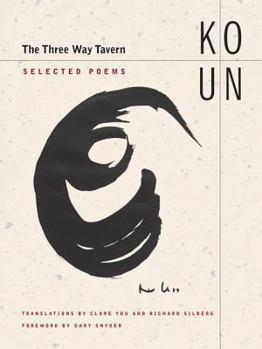The Three Way Tavern: Selected Poems
Select Format
Select Condition 
Book Overview
Ko Un, the preeminent Korean poet of the twentieth century, embraces Buddhism with the versatility of a master Taoist sage. A beloved cultural figure who has helped shape contemporary Korean literature, Ko Un is also a novelist, literary critic, ex-monk, former dissident, and four-time political prisoner. His verse--vivid, unsettling, down-to-earth, and deeply moving--ranges from the short lyric to the vast epic and draws from a poetic reservoir filled with memories and experiences ranging over seventy years of South Korea's tumultuous history from the Japanese occupation to the Korean war to democracy. This collection, an essential sampling of his poems from the last decade of the twentieth century, offers in deft translation, as lively and demotic as the original, the off-beat humor, mystery, and mythic power of his work for a wide audience of English-speaking readers. It showcases the work of a man whom Allen Ginsberg has called "a magnificent poet, a combination of Buddhist cognoscente, passionate political libertarian, and naturalist historian," who Gary Snyder has said is "a real-world poet!" who "outfoxes the Old Masters and the young poets both," and who Lawrence Ferlinghetti has described as "no doubt the greatest living Korean Zen poet today."
Format:Paperback
Language:English
ISBN:0520246136
ISBN13:9780520246133
Release Date:April 2006
Publisher:University of California Press
Length:184 Pages
Weight:0.60 lbs.
Dimensions:0.6" x 6.1" x 8.0"
Customer Reviews
2 ratings
Ko On
Published by Thriftbooks.com User , 18 years ago
I met Ko On and heard his work at the 2006 Geraldine Dodge Poetry Festival. Despite the language difference, Ko On's wit, intelligence, life experience, and talent, came through very clearly and he held his audiences enthralled. It was a privilege to hear him. Don't miss this book; it's a pleasure to read, though this poet has lived through times too terrible for most of us to imagine. As a writer friend says, "Life is all material," and Ko On uses it all with a very skilled poet's hand indeed. Small wonder he is one of Korea's most respected (and prolific) poets. I look forward to reading more of his work.
What I don't know
Published by Thriftbooks.com User , 18 years ago
The selection of Ko Un's Korean poetry in translation makes three things clear: (1) Korean poetry is not Chinese poetry although there are several similarities. (2) Korean poetry is not Japanese poetry although there are several similarities. (3) I am unfamiliar with Korean poetry. (Admittedly, this is only the 2nd volume of Korean poetry I have read.) Why is that important? Because many of the poems required me to try to understand the aesthetics beneath the poem - otherwise the poem was simply "average." However, as I stuck with the book I began to understand more and more how to read the poems - and to recognized the brilliance of many of them. Going back to the earlier poems, I discovered how much I had missed in my first readings. The poems that required the least of myself as reader were those poems closest to Chinese sensibilities. The poem that required the most, I suspect are Korean "free verse." The poems themselves are a wonderful breadth of life - monk, husband, political activist ... Ko Un is all and he brings his whole experience to his poetry. This creates poetry based usually in everyday life that contains an intense understanding of that life. An example: Byong'ogi Born a hick, he started working at the age of five, had to work alongside his dad. ... It was fun, half a day hunting snails, fun to get away from the drudgery. ... No graves for children, no services for children, just born and died.






